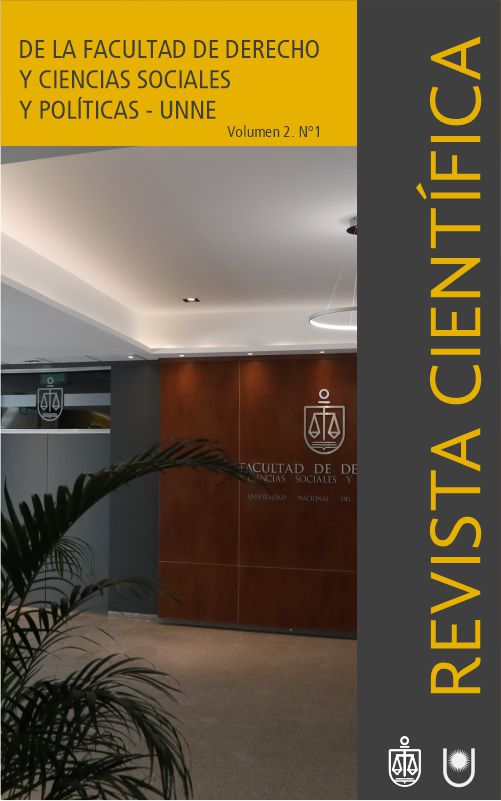When the law is broken and the state vanishes: the labor scenario of the correntinean press
DOI:
https://doi.org/10.30972/rcd.216599Keywords:
Outsourced markets, labor precariousness, transnational financial capitalismAbstract
This article analyzes the working conditions of print journalism in the province of Corrientes (Argentina) between 2008 and 2020. It recovers the conceptual contributions of authors who problematize the implications of the current phase of capitalism and its consequences in the field of labor relations, as well as the modes of labor organization imposed by neoliberalism as a regime and the role of the State in protecting acquired labor rights. The objectives of the research are as follows: to describe the conditions of precariousness of print journalism in the province of Corrientes and to reflect on the interference of the State in the guarantee of labor rights. To achieve these objectives, the following research techniques were used: analysis of the legislation that regulates labor activity, observations of participants in internal assemblies of the Board of Directors of the Asociación de Periodistas de Corrientes (APC) and analysis of the press releases that systematize the main problems of the sector. The conclusions state that, despite the central role that journalism plays in strengthening democracy in society, the State has not managed to propose effective strategies for the protection of the sector’s labor rights. Keywords Outsourced markets, labor precariousness, transnational financial capitalismReferences
Abril, F. (2018). Repensar la dominación. Axel Honneth y el legado de la Teoría Crítica. Revista mexicana de ciencias políticas y sociales, 63(232), 103-128.
Becerra, M. (2018). Transformaciones, cambios en el ecosistema y nuevos actores en la era de la digitalización de los flujos de información y comunicación. En M. Mociulsky et al. (Eds.), La vida digital de los medios y la comunicación: ensayos sobre las audiencias, el contenido y los negocios en internet, Ediciones Granica S.A.
Bronstein, A. (2023, 9 de mayo). Perfil de Derecho Laboral nacional: República de Argentina. Organización Internacional del Trabajo. Recuperado de https://www.ilo.org/ifpdial/informationresources/national-labour-law-profiles/WCMS_159145/lang--es/index.htm
Brown, A. (2016). El pueblo sin atributos. Malpaso.
Constitución Nacional de la República Argentina [Const]. Art. 14 bis. 22 de agosto de 1994 (Argentina).
Honneth, A. (2009). Crítica del poder. Mínimo Tránsito.
Formento, W. y Santella, H. (2001). Nuevas formas de capital, impacto sobre la organización del trabajo. Centro de Investigaciones en Política y Economía (CIEPE).
García Linera, A. (2016). Nueve tesis sobre el capitalismo. Foro de la Izquierda.
Grisolia, J. A (2003). Derecho del Trabajo y de la Seguridad Social. Ediciones Depalma.
Gomes, C. y Mangabeira Unger, R. (1998). Una alternativa práctica al neoliberalismo. Océano.
Han, B. (2014). Psicopolítica. Herder Editorial.
Lewkowicz (2006). Pensar sin Estado. La subjetividad en la era de la fluidez. Paidós.
Loredo, M. S. (2020, 7 de mayo). Las normas internacionales en el Derecho del Trabajo argentino. Recuperado de https://www.saij.gob.ar.
Mancini, F. (2017). Asir incertidumbres: riesgo y subjetividad en el mundo del trabajo. El Colegio de México.
Marini, R. M. (1997). Proceso y tendencias de la globalización capitalista.
En C. E. Martins (Ed.), América Latina, dependencia y globalización. Fundamentos conceptuales. Consejo Latinoamericano de Ciencias Sociales
(CLACSO).
Marino, S. y Espada, A. (2023). Desafíos (y propuestas) para la viabilidad de la actividad periodística en América Latina. UNESCO.
Sautu, R. (2005). Todo es teoría. Objetivos y métodos de investigación. Ediciones Lumiere.
Downloads
Published
How to Cite
Issue
Section
License
Copyright (c) 2023 Research Journal of the Faculty of Law and Social and Political Sciences – UNNE

This work is licensed under a Creative Commons Attribution-NonCommercial 4.0 International License.







52.jpg)






